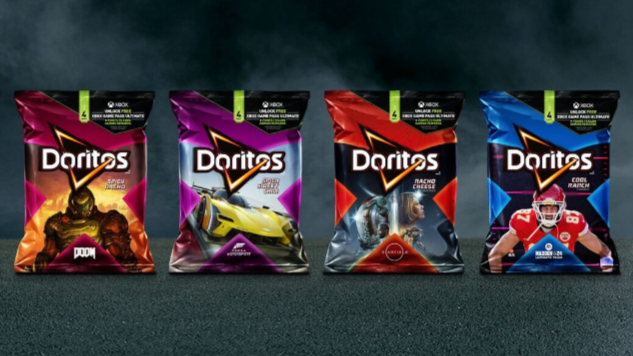They're back: Doritos code thieves awaken from their long slumber to pilfer the codes off Xbox chip bags
Bite me.

Doritos have been running gaming promotions for decades now, which has never really made sense to me. Who wants to interrupt a gaming session to cover your fingers in a greasy chilli coating? Why not just take a break and have a meal with cutlery and stuff?
Such questions are as naught next to the rolling juggernaut that is brand synergy, however, and so Doritos' latest promo is a familiar one: the bags have codes on them that, when redeemed, grant players a month of Xbox Game Pass or Ultimate, along with a chance of winning various more substantial prizes.
The promotion runs until 17 December and sees bags of chips bearing the visage of Master Chief, Starfield and Madden-branded bags, and others. All of these have the promotional codes printed… on the outside of the bag. You can probably see where this is going.
"PSA about the Doritos promo" read a now-deleted post on the official Halo Discord that soon found its way to reddit. "Make sure to test if the code works before you buy the bag. A lot of codes on the Doritos bags are being redeemed by assholes who aren't buying the bags. Also, be a decent person. If you find a bag and redeem a working code, buy the bag like I did. Don't be like the jerks."
So many questions, though I think I understand why they soon enough deleted the post. Test the codes before you buy the bags? So… go into your local store and stand in front of the Doritos bit entering codes one-by-one until you get a working one? That doesn't exactly seem like sociable behaviour. In fact it seems like a readymade excuse for any code thieves caught in the act: I was just checking, your honor!
We've been here before: last year saw a Jack Links beef jerky promotion for Call of Duty that soon enough had the XP thieves ripping those codes right off the shelves. And it doesn't seem surprising, in a world where almost everyone has a camera in their pocket, that some unscrupulous sorts will pick up the bag, snap the code, put it back and walk off to fill their boots at some poor chip aficionado's expense.
Much of the response focused on the ease of doing this rather than the act itself: there is a sense in which Doritos is kinda asking for it here. Various creative solutions have been suggested, though I did quite like the contribution of our friend triggerkiller: "they should print one character of the code on one chip each, ez."
The biggest gaming news, reviews and hardware deals
Keep up to date with the most important stories and the best deals, as picked by the PC Gamer team.
"This sucks it happened to me today," added the suspiciously named a_chubby_cat. "Found a bag and sure enough it was already redeemed when I got home! I don’t even eat Doritos!"
There are also those who are on the side of the code thieves, and say if they can take advantage of someone else's oversight then good luck to them. How far we have fallen from God's light. It's also worth saying that thievery isn't the only possible explanation for this, because you'd be amazed at how much trouble people can have with something like entering a code (or indeed knowing what it is valid for).
Searching social media for "Doritos Xbox code" will also show you a ton of people complaining that their codes don't work or are coming back as invalid, and as a bonus will make you never want to work in customer support for Doritos, ever.
These kinds of shenanigans have been going on ever since Doritos et al started putting codes on their packets over a decade ago: I guess it's just more visible now that more people are aware of the flaws in the system. Well, the one giant huge glaring flaw. Interestingly enough some brands have a solution: Rockstar energy drinks, for example, put the code under the ringpull. But it does seem baffling that other manufacturers haven't yet managed to come up with a thief-proof method for marketing stunts.

Rich is a games journalist with 15 years' experience, beginning his career on Edge magazine before working for a wide range of outlets, including Ars Technica, Eurogamer, GamesRadar+, Gamespot, the Guardian, IGN, the New Statesman, Polygon, and Vice. He was the editor of Kotaku UK, the UK arm of Kotaku, for three years before joining PC Gamer. He is the author of a Brief History of Video Games, a full history of the medium, which the Midwest Book Review described as "[a] must-read for serious minded game historians and curious video game connoisseurs alike."

